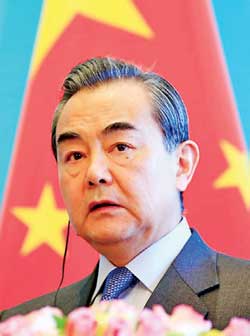Tuesday Feb 24, 2026
Tuesday Feb 24, 2026
Wednesday, 24 January 2018 00:08 - - {{hitsCtrl.values.hits}}
 BEIJING (Reuters): The United States, not China, threatens the global trade system, China’s foreign ministry said on Monday, after U.S. President Donald Trump’s administration called U.S. support for Beijing’s joining the World Trade Organization in 2001 a mistake.
BEIJING (Reuters): The United States, not China, threatens the global trade system, China’s foreign ministry said on Monday, after U.S. President Donald Trump’s administration called U.S. support for Beijing’s joining the World Trade Organization in 2001 a mistake.
WTO rules have proved ineffective in making China embrace a market-oriented trade regime, and the United States “erred” in backing China’s entry to the trade body on such terms, the office of the U.S. Trade Representative said last week. Its report came as Trump weighs a series of trade actions against Beijing, including a decision in a “Section 301” investigation into China’s alleged theft of intellectual property, expected in the next few weeks.
Foreign Ministry spokeswoman Hua Chunying said that since China joined the WTO, it had strictly followed the body’s rules, carried out its obligations and contributed to the development of the multilateral system. Other countries have benefited from trade with China, which has stuck by the route of reform and opening up and has supported an open global economy, she added.
“I think everyone has seen that it’s precisely the United States’ unilateralist methods, and the sounds it’s made on unilateralism, that are an unprecedented challenge to the multilateral trade system,” Hua told a regular news briefing.
“Many WTO members have already expressed worry about this,” she added.
“So we hope the United States can correctly view China and at the same time take their own actual steps to protect the multilateral trading system.”
China has sought to portray itself as a champion of global trade in the face of Trump’s “America First” policies, despite criticism from foreign businesses, and their governments, that many parts of its market are protected from foreign competition.
Critics also say Chinese industrial policies seek to assimilate and supplant foreign technology.
White House officials have said China has failed to follow through on promises to move toward a market-oriented economy. Trump told Reuters in an interview last week that he was considering a big “fine” against China for forcing U.S. companies to transfer their intellectual property to China as a cost of doing business there.
In Beijing, many experts believe Washington is unwilling to pay the heavy economic price needed to upset prevailing trade dynamics between the two countries, including China’s record high trade surplus of $275.81 billion with the United States in 2017.